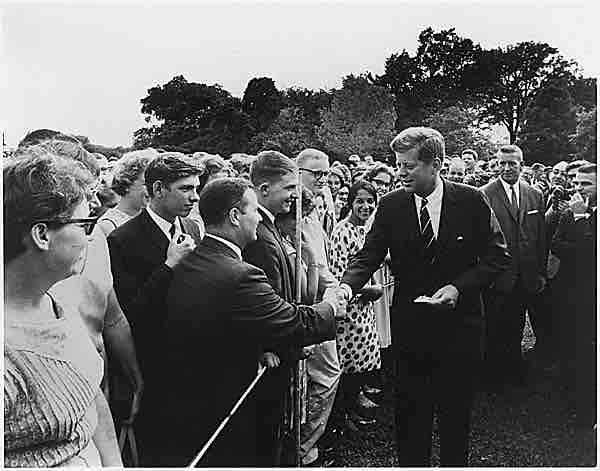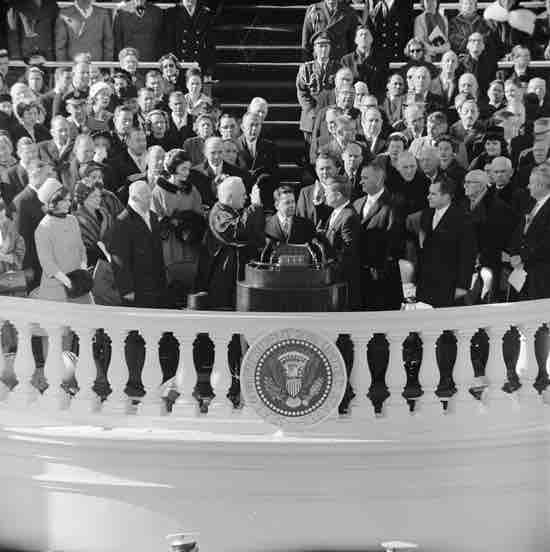John F. Kennedy
John F. Kennedy was sworn in as the 35th President of the United States on January 20, 1961. In his inaugural address, he spoke of the need for all Americans to "Ask not what your country can do for you; ask what you can do for your country." He called upon the nations of the world to join together and fight what he called the "common enemies of man: tyranny, poverty, disease, and war itself." In closing, he expanded on his desire for greater internationalism: "Finally, whether you are citizens of America or citizens of the world, ask of us here the same high standards of strength and sacrifice which we ask of you."
The address reflected Kennedy's confidence that his administration would chart a historically significant course in both domestic policy and foreign affairs. The contrast between this optimistic vision and the pressures of managing daily political realities at home and abroad would be one of the main tensions running through the early years of his administration. Despite the challenges he faced while in office, Kennedy consistently ranks high in public opinion ratings of U.S. presidents. He was assassinated before the end of his term on November 22, 1963.
Foreign Policy
Kennedy's foreign policy was dominated by American confrontations with the Soviet Union, manifested by proxy wars in the early stage of the Cold War and coming to the brink of nuclear war with the Cuban Missile Crisis. His administration was characterized by a policy of containment and a new support for third world countries and their nationalist movements. Kennedy's management style differed from his predecessor, Dwight Eisenhower, favoring an organizational structure of a wheel with all spokes leading to the president.
As one of his first presidential acts, Kennedy asked Congress to create the Peace Corps. Through this program, still in existence today, Americans volunteer to work in underdeveloped nations in areas such as education, farming, health care, and construction. The organization grew to 5,000 members by March of 1963 and 10,000 the following year. Since 1961, over 200,000 Americans have joined the Peace Corps, serving in 139 countries.

Peace Corps
Kennedy greeting Peace Corps volunteers, 1961
Domestic Policy
Kennedy called his domestic program the "New Frontier." It ambitiously promised federal funding for education, medical care for the elderly, economic aid to rural regions, and government intervention to halt the economic recession of the time. In his 1963 State of the Union address, he proposed substantial tax reform and a reduction in income tax rates. Congress passed few of Kennedy's major programs during his lifetime, but it did vote them through in 1964–65 under his successor Lyndon Johnson. During his time in office, Kennedy ended a period of tight fiscal policies, loosening monetary policy to keep interest rates down and encourage economic growth. The economy, which had been through two recessions in three years and was currently in a recession when Kennedy took office, turned around and prospered. Gross domestic product (GDP) expanded, inflation remained steady, unemployment eased, industrial production rose, and motor vehicle sales rose.
Civil Rights
President Kennedy initially proposed an overhaul of American immigration policy that later became the Immigration and Nationality Act of 1965. It dramatically shifted the source of immigration from Northern and Western European countries toward immigration from Latin America and Asia, and it also shifted the emphasized family reunification. Kennedy wanted to dismantle the selection of immigrants based on country of origin and saw this as an extension of his civil rights policies.
Kennedy also made several motions to support African-American civil rights as well as the rights of other marginalized groups, such as women. During his time in office, he signed the executive order creating the Presidential Commission on the Status of Women on December 14, 1961. Former First Lady Eleanor Roosevelt led the commission. On June 10, 1963, Kennedy signed the Equal Pay Act of 1963, a federal law amending the Fair Labor Standards Act and aimed at abolishing wage disparity based on sex.
The Space Program
Kennedy is also known for the expansion of the U.S. space program. On April 12, 1961, Soviet cosmonaut Yuri Gagarin became the first person to fly in space, which reinforced American fears about being left behind in a technological competition with the Soviet Union. Kennedy wanted the U.S. to take the lead in the so-called "space race" for reasons of strategy and prestige.
On November 21, 1962, in a cabinet meeting with administrator of the National Aeronautics and Space Administration (NASA) James E. Webb, as well as other officials, Kennedy explained that exploring the moon was important for reasons of international prestige and justified the expense of a program to facilitate this. Vice-President Johnson assured that lessons learned from the space program had military value as well, and so the space program under Kennedy began. Costs for the Apollo program were expected to reach $40 billion. On July 20, 1969, almost six years after Kennedy's death, Apollo 11 landed the first manned spacecraft on the moon.

JFK Inaguration
John F. Kennedy was inaugurated on January 20, 1961.